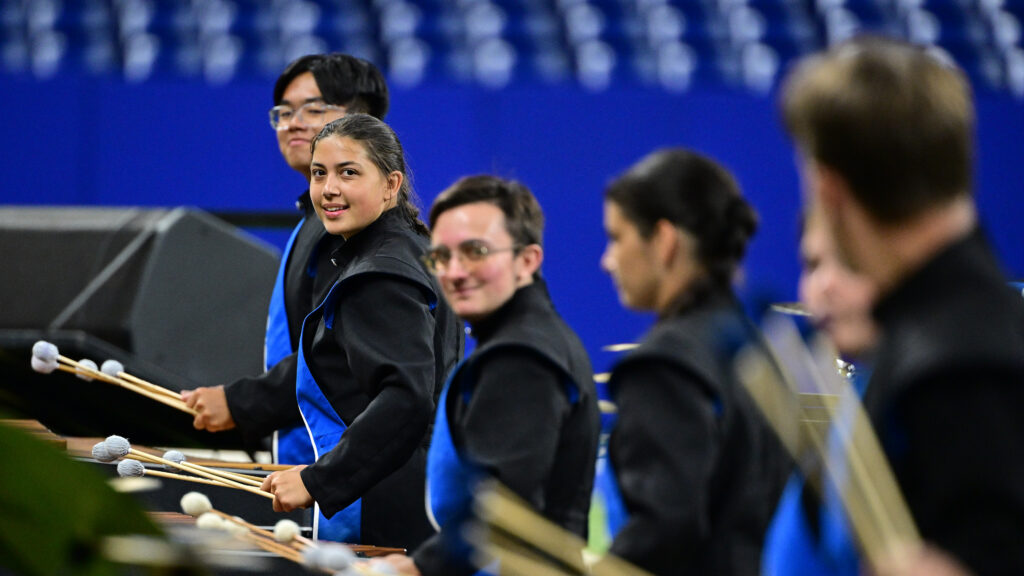Ever heard the phrase “Perfect practice makes perfect”? It stumped me for years — you generally have to practice to become perfect, so how can your practice perfectly if you have to practice to get perfect? But eventually I realized it’s not about being perfect while you practice, but rather about practicing perfectly.
Practicing perfectly is not an easy skill. We’ve all had practice sessions where, after two hours in the practice room, we realize we haven’t gotten nearly enough accomplished. Given the daily schedule of the average college or high school student, no one has that kind of time to waste, so the key to achieving perfect practice is to efficiently utilize what time we have.
I’ve compiled a few suggestions, based on my own experiences, that I hope will be helpful to you, both as you prepare for the upcoming season, and in your personal musical pursuits. A disclaimer first: If you have a practice regimen that works for you, stick with it! There is no ‘right’ or ‘wrong’ way to go about this, as long as you are accomplishing what you want; these are just a few suggestions that work for me.
And also an apology, to all the guard members out there: What I know about spinning wouldn’t fill a thimble, so most of these suggestions are oriented towards brass and percussion players.The first element in practicing perfectly is setting yourself up to practice perfectly. When you walk into a practice room, or get ready to sit down for a practice session, make sure you have everything you could possibly need: Music, method books, exercises, all varieties of mallets/sticks/mouthpieces/etc., and especially a metronome — never EVER practice without a metronome nearby!
Grab a drink and/or a snack, and use the restroom. You would never walk on a practice field in the summer without a water cooler, sunscreen, music, drill, and everything you need to play well, so don’t go in the practice room without those things either!
The next step is to organize your practice time. Know how much time you have available to practice, what needs to get done within that time, and schedule blocks within that time to devote to each exercise or piece accordingly. This takes a certain amount of planning, even if you do that planning while you warm up! I find the “_________ of the Day” system useful: Scale of the Day, Exercise of the Day, Technique of the Week, etc. This allows you to focus on a particular exercise or skill and really break it down at a very slow tempo, ensure that you are executing the technique correctly — and hitting the right notes! — and then gradually take the tempo up while continuing to execute the technique correctly. This takes a lot of patience but it’s worth it!
This method also generally leaves enough time to work on another piece or two of music from ensemble parts or private lessons, or if that’s not an issue, you can do two exercises in one day or spend extra time on your show music. Be sure to save one day a week to run all your exercises and show music. This gives you a good baseline for how far along you are and how much more progress you need to make before the next camp, and can help you in setting practice-schedule priorities for the next week.
The other biggest obstacle most of us face in the practice room is staying motivated. When you’re playing the same exercise for what feels like the 4,732,648th time and the computer is calling your name louder than you can drown it out by playing, it takes a Herculean strength of will to keep the horn or sticks in your hands!
So find innovative ways to motivate yourself. I frequently listen to rock music when playing basics such as scales or arpeggios; grooving out makes playing the same old thing a lot more enjoyable. Many people watch television or movies while they practice. Try setting tempo goals — join the 200 Club! — or rewarding yourself when you complete all your “assignments” for the day. Be sure to warm up — and warm down, for brass — properly.
Jumping into hardcore (or hard-corps!) practicing without warming up can do serious damage to your playing muscles and set you up for hard-to-break bad technique habits. Also be sure to do chop-building exercises regularly. Beginning everyday rehearsals without sufficient muscle endurance is just asking for repetitive motion injury as overstressed muscles compensate in unhealthy ways.
This can endanger not only your drum corps season but any future playing or marching experiences. Take it from someone who battles this every day — you don’t want to have to deal with it!
Next you need to find your best practice time. I know people who love to get their practicing out of the way early in the day; I prefer to do it late at night, when everything else is done and I feel I can really focus. Whenever you are most relaxed, alert and prepared to learn is the best time to practice.
The last element in perfect practice is knowing when to take a break or even throw in the towel. One of my friends uses the phrase “the marimba doesn’t want to talk to you right now” to describe the point when it’s time to walk away for a few minutes. Knowing when you reach this point is key: Beating your head against an exercise when your instrument doesn’t want to talk to you is far more detrimental than useful. Go get a drink of water, use the restroom, chat with someone briefly — you’ll find that your head is much clearer and you’ll be able to focus better after a few minutes away from the instrument.
And also recognize that occasionally both your brain and chops just need a day away from practicing. Most corps take off days or evenings occasionally throughout the summer, and with good reason: Our brains need time to absorb, process and utilize the information we learn during our rehearsal time, and this can only be accomplished while NOT rehearsing. This holds true in the winter just as much as it does in the summer. You set yourself up for success in the summer via your hard work in the winter. Likewise, you can set yourself up for success in the practice room by making effective use of your practice time. Make perfect practice your goal, and you’ll be surprised how much more easily everything else falls in place. Happy practicing!
Send Emily feedback and ideas at [email protected]. Emily Tannert is currently living in Knoxville, Tenn., taking a year off from school before she returns to Northwestern University in Evanston, Ill., for a master’s degree. She was the 2002 drum major for the Pioneer, and will play in the 2003 Glassmen pit. She will age out in 2003.





